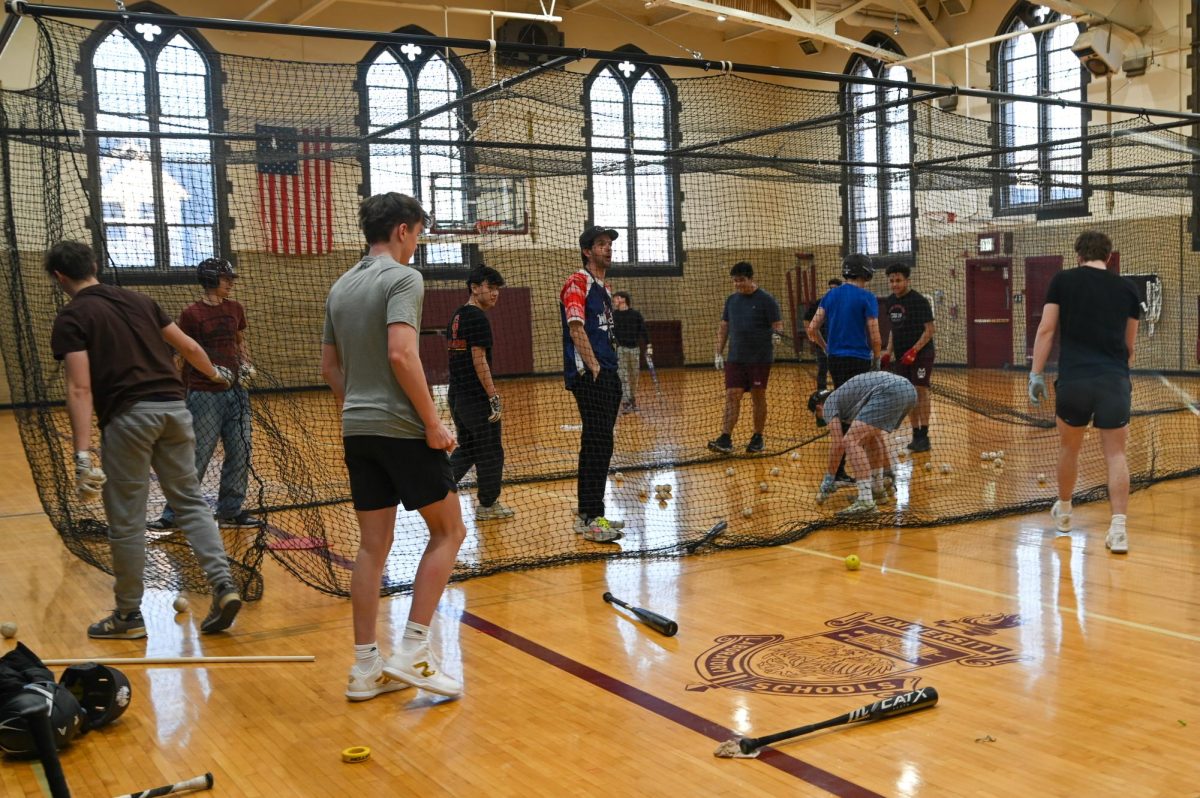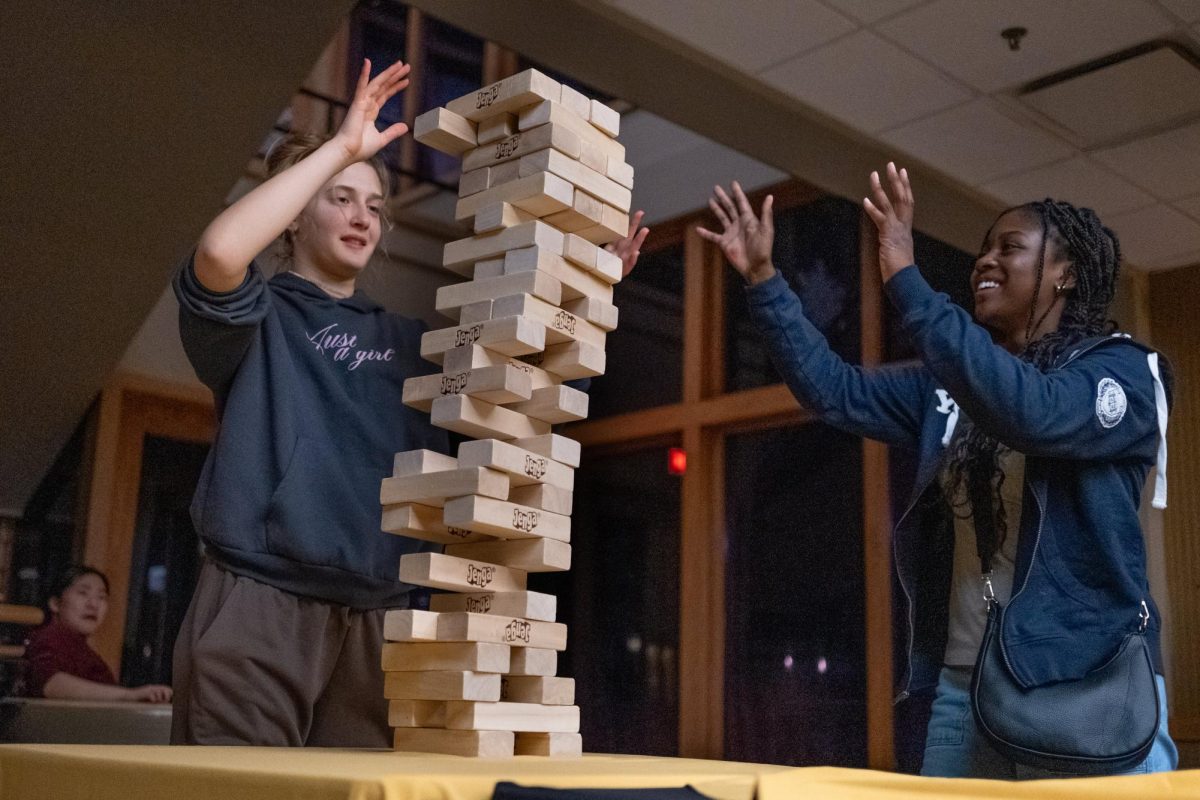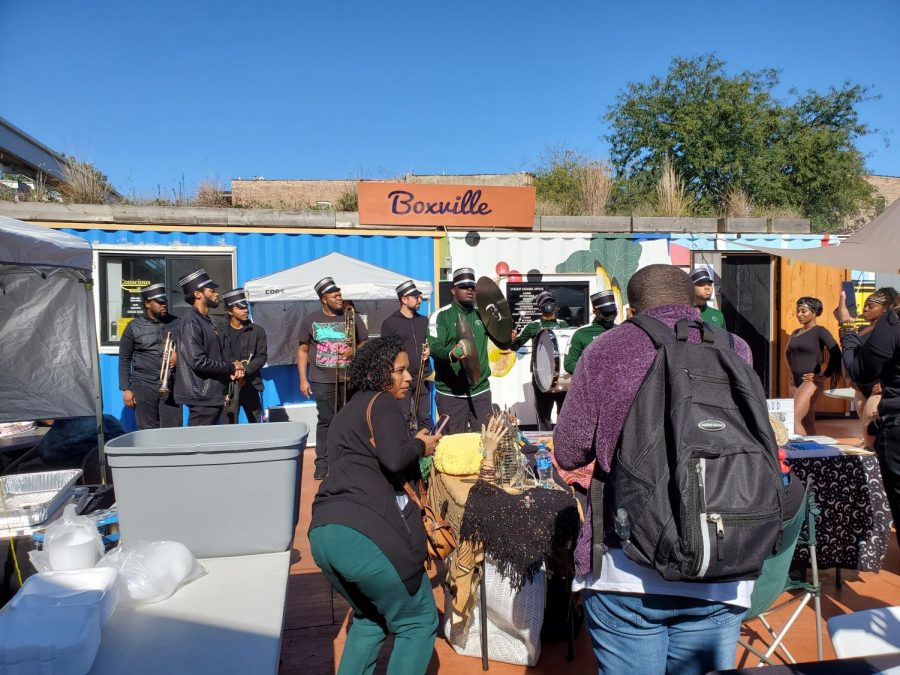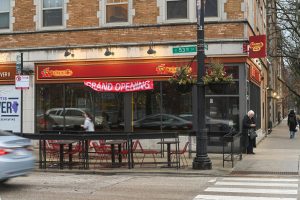Minority entrepreneurs create innovative Bronzeville marketplace
Visitors cluster around the center of the plaza to watch the Chicago State University marching band on Oct. 17 during Boxville’s final event of the year.
November 3, 2021
Barbecue smoke and music permeate the air on an unseasonably hot October afternoon as a Green Line L train rattles by overhead. People move among vibrantly colored shipping containers talking, eating and laughing.
Suddenly, the music cuts out and people cluster around the center of the plaza as a small marching band comes out to perform. The mood is celebratory, but this event is bittersweet as this is the last event of the season at the Boxville market.
The Boxville project began in 2017 with five “boxes” located at 51st Street and Calumet Avenue, adjacent to the 51st Street Green Line station. Since then Boxville has expanded, this season boasting 22 shipping containers and 12 businesses that operate out of the location year-round.
Boxville is almost entirely made up of small, minority-owned businesses. The market’s unique environment offers several benefits.
William Jamison, the owner of The Work Spot, a clothing print shop, said he felt the transition from a workshop in his basement to a storefront at Boxville solidified The Work Spot as a full-fledged business.
From the beginning, Boxville was designed to be a place where businesses from the community could get their start. The Urban Juncture Foundation, the nonprofit which runs Boxville, specifically designed the market to mitigate a variety of issues small business owners on the South Side face when starting their enterprises including prohibitive start up costs, a lack of existing customer base in the neighborhood and a general absence of support mechanisms for the starting of a business.
Boxville is just one of five major initiatives in Urban Juncture’s Build Bronzeville project, which seeks to contribute to the revitalization of the Bronzeville neighborhood. The other four initiatives are the Bronzeville Incubator, an office space for local entrepreneurs who need a space to work; Engage Bronzeville, a project focused on the beautification of spaces in the neighborhood; Bronzeville Cookin’, a facility that offers more conventional storefronts than Boxville specifically for restaurants; and The Forum, an old community theater which provides space for creative performance.
Janeen Mays, a marketing consultant for Urban Juncture, said the value of the Build Bronzeville project comes from the variety of initiatives.
“There’s a synergy with all five groups to make the community a stronger, more viable place to do business,” Ms. Mays said.
Some of the other businesses at Boxville include Natty Bwoy, a bike and skate shop; Southside Grinds, a coffee shop; Last Lap Cornerstore, an athletic wear store; and a location of the Bronzeville Historical Society.
Mr. Jamison thinks that the diversity of businesses present at Boxville benefits everyone involved.
“It’s a market and then it’s like, it’s filled with just a lot of moving, like energy, inspiration and we all grow together as a unit so it’s really cool,” Mr. Jamison said.
A unique development at Boxville this summer was the presence of Lululemon, by far the largest business that has ever used the Boxville space. Karla Huffman, Community Lead for Lululemon in Chicago, explained Lululemon wanted to open a South Side store and contracted for six months to do fitness classes for free.
Lululemon’s last day at Boxville was Oct. 17. They plan to open a permanent store in Hyde Park on 53rd Street in November.
Kayla Jeter, a Lululemon ambassador who ran many of the events at Boxville this summer, enjoyed interacting with the community.
“It’s been absolutely incredible,” Ms. Jeter said. “Not only the warm welcome and everyone supporting each other as individual businesses, especially minority-owned businesses, but the community itself just pulling up, showing up and being curious.”
Events are among the most important parts of the Boxville experience. Market days occurred once a week throughout the summer into October. The final event took place on Oct. 17 and was centered on an Open House Chicago exhibition, a program run by the Chicago Architecture Center which highlights unique architectural sites across the city. Most Boxville businesses were open for the event, which also featured a DJ and a live performance from the Chicago State University marching band.
Sandria Washington, the director of engagement and partnership for Urban Juncture, argued that events are a core part of the strategy of attracting customers to Boxville, for the benefit of everyone there.
“They know it’s going to be vibrant, and exciting, there’s gonna be good food, good music, good people,” Ms. Washington said. “So we’re just giving people the best of what Boxville has to offer.”
Boxville is a success story of minority entrepreneurs working with each other and their community to improve their businesses and contribute to the revitalization of their neighborhood.
Betty Fair, Lead Steward of the Bronzeville Community Garden and owner of Grow Sumthin, a garden store that had a box at the market, believes that Boxville is a place of growth.
Ms. Fair said, “And that’s what Boxville is, a place where you grow, you grow something, your businesses, your ideas, your mind and opportunities, and that’s what Boxville is.”































































